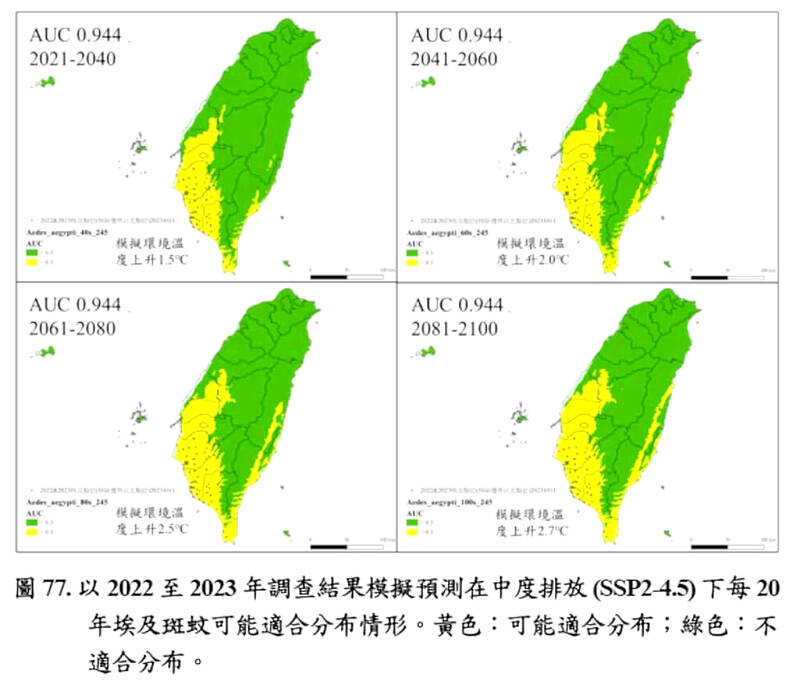Mosquitoes carrying the dengue virus are not venturing northward despite isolated sightings as far as New Taipei City, but they are expanding their range to higher altitudes, a study commissioned by the Ministry of Environment found yesterday.
The ministry commissioned the National Health Research Institutes to report on the distribution of dengue fever vectors in response to the UN’s Intergovernmental Panel on Climate Change prediction that harmful arthropods are expanding to higher altitudes.
The report aims to provide a solid, systematic and science-based foundation for the government to reference when drafting policies to control dengue vectors, the ministry said.

Photo courtesy of the Ministry of Environment via CNA
The distribution of the Aedes aegypti, or yellow fever mosquito, which spreads dengue fever and several other illnesses, remained around the same in regions south of Chiayi County’s Budai Township (布袋), Huang Ching-chi (黃旌集), project convener and a researcher at the National Mosquito-borne Diseases Control Research Center, told reporters.
From field studies, the center discovered one yellow fever mosquito in Yunlin County’s Beigang Township (北港) and one in New Taipei City’s Banciao Railway Station in 2022.
Last year, it captured one yellow fever mosquito each in Chiayi County’s Jhongpu Township (中埔) and Taichung’s Sinwurih (新烏日) railway station. As for the Asian tiger mosquito, Huang said it has shown signs of expanding to regions higher than 1,500m.
Studies between 2009 and 2011 showed isolated incidents of Asian tiger mosquitoes in areas 1,700m above sea level, but this year’s study showed a general expansion of the mosquito population in places higher than 1,500m, he said.
However, with fewer population centers in mountainous regions, the presence of Asian tiger mosquitoes should not contribute to increased dengue outbreaks, the study said.
Huang said that spare tires, empty barrels and buckets, junked bathtubs, urns, pots and pans, which are often used as makeshift flower pots, are also possible sites for carrier mosquitoes to lay eggs.
Yellow fever and Asian tiger mosquitoes found in high-altitude areas often hatch from water in spare tires, he said.
The eggs of disease-carrying mosquitoes are known to last for up to half a year in dry conditions and hatch when next exposed to water, Huang said, urging people to clean out tires when possible and to remember to puncture holes in them to drain out water.
If climate change causes temperatures to rise by 1.5oC by 2040, yellow fever mosquitoes could range as far north as Hualien County’s Rueisui Township (瑞穗) in the east and Taichung’s Taiping District (太平) in the west, the study showed.
If temperatures rise 2oC by 2060, the mosquitoes are expected to expand to Hualien City in the east and Taichung’s Beitun District (北屯) in the west, it said.
A 2.5oC increase by 2080 would see the mosquitoes extend their range further north to Taichung’s Tanzih District (潭子) in the west, it said.

The Ministry of Foreign Affairs (MOFA) yesterday voiced dissatisfaction with the Comprehensive and Progressive Agreement for Trans- Pacific Partnership (CPTPP), whose latest meeting, concluded earlier the same day, appeared not to address the country’s application. In a statement, MOFA said the CPTPP commission had "once again failed to fairly process Taiwan’s application," attributing the inaction to the bloc’s "succumbing to political pressure," without elaborating. Taiwan submitted its CPTPP application under the name "Separate Customs Territory of Taiwan, Penghu, Kinmen and Matsu" on Sept. 22, 2021 -- less than a week after China

ALIGNED THINKING: Taiwan and Japan have a mutual interest in trade, culture and engineering, and can work together for stability, Cho Jung-tai said Taiwan and Japan are two like-minded countries willing to work together to form a “safety barrier” in the Indo-Pacific region, Premier Cho Jung-tai (卓榮泰) yesterday said at the opening ceremony of the 35th Taiwan-Japan Modern Engineering and Technology Symposium in Taipei. Taiwan and Japan are close geographically and closer emotionally, he added. Citing the overflowing of a barrier lake in the Mataian River (馬太鞍溪) in September, Cho said the submersible water level sensors given by Japan during the disaster helped Taiwan monitor the lake’s water levels more accurately. Japan also provided a lot of vaccines early in the outbreak of the COVID-19 pandemic,

Kaohsiung Mayor Chen Chi-mai (陳其邁) on Monday announced light shows and themed traffic lights to welcome fans of South Korean pop group Twice to the port city. The group is to play Kaohsiung on Saturday as part of its “This Is For” world tour. It would be the group’s first performance in Taiwan since its debut 10 years ago. The all-female group consists of five South Koreans, three Japanese and Tainan’s Chou Tzu-yu (周子瑜), the first Taiwan-born and raised member of a South Korean girl group. To promote the group’s arrival, the city has been holding a series of events, including a pop-up

A home-style restaurant opened by a Taiwanese woman in Quezon City in Metro Manila has been featured in the first-ever Michelin Guide honoring exceptional restaurants in the Philippines. The restaurant, Fong Wei Wu (豐味屋), was one of 74 eateries to receive a “Michelin Selected” honor in the guide, while one restaurant received two Michelin stars, eight received one star and 25 were awarded a “Bib Gourmand.” The guide, which was limited to restaurants in Metro Manila and Cebu, was published on Oct. 30. In an interview, Feng Wei Wu’s owner and chef, Linda, said that as a restaurateur in her 60s, receiving an